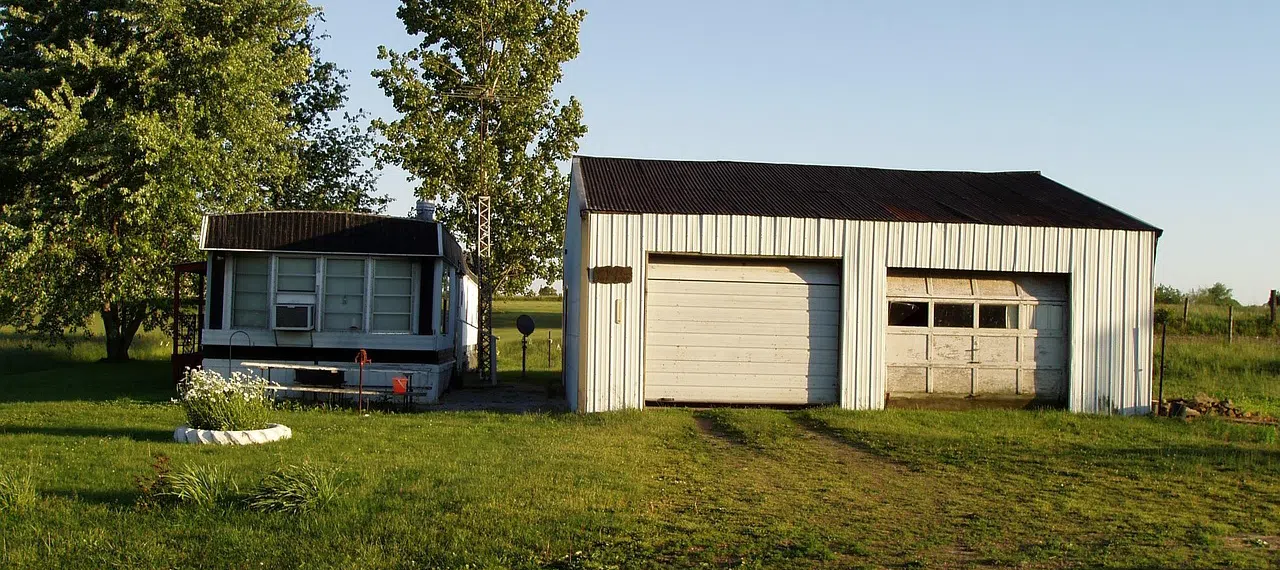Our garages often house more than vehicles and garden supplies, including anything from pet food to kid's toys - and sometimes, wildlife. Finding a single raccoon or a raccoon family dwelling in your detached garage can come as quite a surprise. Learn what you can do to evict the little critters and prevent them from coming back.

Recent calls to Scarborough homes (or more precisely, detached garages) seem to indicate a growing issue in the area. We all know that attics are a favourite hangout for raccoons (particularly over the winter and when litters of kits are born in the spring) but it looks as if detached garages are gaining popularity as well. And rightfully so - after all, they usually provide ample hiding spots and don't see a whole lot of traffic for most of the day or night. Let's look at what attracts wildlife to garages, what problems are associated with raccoons and how to get rid of raccoons from your garage.
Why is a Detached Garage a Raccoon's Ideal Den?
- Shelter and Security
Detached garages can offer protection from the elements as well as predators and usually see minimal human activity; - Seclusion and Privacy
The fact that garages are generally low traffic areas (particularly during the colder months) surely adds to creating ideal conditions for nesting and raising young; - Easy Access Points
Aside from gaps in wood siding, roofline holes, rotted eaves, or lifted shingles, there are more often than not unsecured doors; - Less Human Disturbance
Again, detached garages often aren’t used daily, allowing raccoons to settle in undetected; - Available Nesting Materials
Old boxes, insulation, fabric, or stored goods offer comfort and denning materials.
The Rise of Raccoons Denning in Garages
With raccoon populations exploding, more and more urban structures such as garages and other outbuildings double as raccoon dens.
- Urbanization & Habitat Loss
Continuous urban development keeps pushing raccoons into suburbs and even inner cities; - Food Access Nearby
Usually next to garages, garbage bins and composters can be found. Pet food is often stored in the garage; - Lack of Natural Predators
With the comings and goings of humans, natural raccoon predators such as coyotes tend to keep their distance; - “Artificial Cave” Analogy
Detached garages and/or equipment stored within can mimic safe, enclosed dens;
- Seasonal Timing
Spring (birthing season) and fall (shelter before winter) see spikes in wildlife infestations and raccoons living in garages.
What Happens Once Raccoons Enter Garages?
Wildlife should be admired from afar... not accidentally encountered or startled on your way to the car. Here are some of the issues you may be facing if one or more raccoons have moved into your Scarborough garage:
- Structural Damage
You will likely deal with chewed wires, torn insulation, roof and siding damage; - Biohazard Contamination
Feces and urine pose significant health risks; - Noise Issues
Your home may be subject to nocturnal sounds of movement, scratching, or thumping. Raccoons are also very vocal when communicating with one another; - Disease Risk
Both viral and bacterial infections can be transmitted to your family or pets. These include rabies, raccoon roundworm, leptospirosis, and other zoonotic threats; - Infestation by Parasites
Fleas, ticks, and mites can spread beyond the garage to your pets and even your home; - Aggressive Raccoons
Startled raccoons, especially if felt cornered, can become feisty and aggressive. Young mothers will also rally to defend their kits.
Why do Detached Garages Make the Problem Worse Over Time?
 Detached garages are often older buildings and more vulnerable as they tend to be less maintained and located closer to laneways, alleys, and ravines - all natural travel corridors for raccoons.
Detached garages are often older buildings and more vulnerable as they tend to be less maintained and located closer to laneways, alleys, and ravines - all natural travel corridors for raccoons.- Long term degradation such as defects or cracks in brickwork, decaying wood planks or panels, and weakened eaves give raccoons more and easier access points over time. These type of buildings require scheduled inspections and maintenance to minimize entry, though realistically, you'll likely not be able to seal off every nook and cranny to keep raccoons from pitching a tent in your garage.
- Raccoons are intelligent and adapt quickly; once one raccoon successfully dens in a detached garage, others in the area may follow suit, turning it into a habitual denning spot.
Challenges of Raccoon Removal from Garages
Homeowners may face difficulties when dealing with raccoons in their garages for a number of reasons:
- Hard-to-Reach Areas
Tight, cluttered spaces make humane trapping more difficult; - Nesting Mothers
Removing mothers and all kits requires expertise and patience; - DIY Risks
Raccoon urine and feces can be dangerous to humans and pets; this is a job for the professionals; - Partial Solutions Fail
Without sealing off all entry points and continuous monitoring, raccoons will return. It's not a question of if, but rather when.
Hawkeye’s Guaranteed Raccoon Removal in Scarborough
- Legal Advantage
Hawkeye Bird & Animal Control is the only company in the GTA licensed and equipped to humanely euthanize raccoons; - Why This Matters
Permanent raccoon removal prevents return — this is especially crucial in detached garage;
. - Comprehensive Clean-Up
Part of the removal process should be removing all nesting materials and biological waste. Again, this is a job for professionals and requires safety protocols; - Professional Exclusion
An experienced raccoon removal company such as Hawkeye can help you identify multiple access points and advise on sealing or reinforcing any structural vulnerabilities; - Experience in Urban Wildlife Habitats
Hawkeye has over 35 years of proven expertise in getting rid of detached garage raccoon infestations.
Prevention and Long-Term Detached Garage Protection
- Wildlife-Resistant Doors and Seals
You'll want to close gaps with durable materials and professional installation; - Roof and Soffit Reinforcements
Your garage roof is especially prone to a breach and will likely require metal flashing and vent covers; - Routine Inspections
Even if you don't use your garage daily, make it a habit to look for chew marks, droppings, or new entry points; - Declutter the Garage
Reduce materials that attract nesting (insulation, soft goods) as well as machinery or farm equipment that can double as a den; - Partner with Hawkeye
Let's schedule annual inspections and devise a customized wildlife prevention plan for you and your Scarborough property.
Contact Hawkeye Bird & Animal Control
Let's evict the raccoons nesting in your detached Scarborough garage right now and deploy preventative measures to help stop recurrence of the problem. Consider our permanent raccoon removal option - the only way to guarantee that the anima(s) will not return.
Call Hawkeye today and take control of your garage, your home, and your property. Raccoon Removal Services are available in all of the GTA, including Toronto, Scarborough, Brampton, Vaughan, Markham, Ajax, Pickering, Newmarket, Etobicoke, Oshawa, and Mississauga.
Related Articles:
https://www.hawkeye.ca/blog/how-to-get-rid-of-raccoons
https://www.hawkeye.ca/blog/why-detached-homes-in-toronto-face-a-higher-risk-of-raccoon-in-the-fall
https://www.hawkeye.ca/blog/get-rid-of-raccoons-in-vehicle-tarp-shelters














